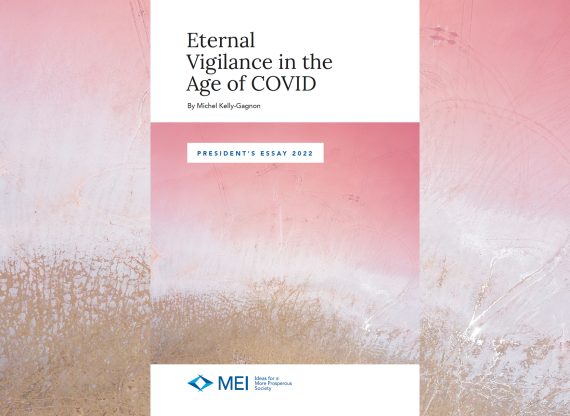Eternal Vigilance in the Age of COVID (en anglais seulement)

This President’s Essay addresses the most contentious and pressing issue of our day: the COVID-19 pandemic and our response to it. Now that the pandemic seems to be subsiding, and government-imposed restrictions as well, it is a good time to look back and take a calm and measured look at some of the key issues that were raised by it. This is important to do, since we are not immune to future waves, or to crises, real or perceived, coming from other quarters.
My goal here is not to take a decisive position on the various government restrictions and responses during the pandemic. Readers can come to their own conclusions about the efficacy and proportionality of these measures. My objective in this essay is instead specifically to encourage us to ask these questions and have serious and reasonable debates among ourselves and with our fellow citizens.
One thing that concerns me is the extent to which public discourse around the pandemic has become polarized and produced a climate in which reasonable people cannot have reasonable disagreements. Too often, it seems as though in order to hold respectable opinions, one must unquestioningly accept and support all the measures and restrictions we have been subjected to over the past two years. Dissent from this and you are lumped in with so-called “anti-vaxxers” and “COVID deniers.” Considering the importance of these debates, this is an unacceptable state of affairs. What this essay seeks to do is sketch out a reasonable middle ground position, not to prove to you that this position is the indisputable truth, but to show that we can have a reasonable disagreement over the pandemic response.
I will do this in the present essay not simply by offering my own opinion, but by presenting some serious scholarship to support this view. Using a paper written by George Mason University Professor of Economics Christopher Coyne and his colleagues, we can see how infectious diseases produce what they call “infection externalities.” While these externalities theoretically justify government interventions to correct them, officials run into the challenges that all top-down officials and policy planners do. The officials that advise on these matters are not omnipotent angels with the capacity to come up with perfectly appropriate and proportional solutions, and the very nature of the challenges we face and the infection externalities they produce means we should be skeptical of the ability of top-down planners to adequately consider the trade-offs inherent in their decisions. Building on the work of James Buchanan and public choice theory, my argument will use both Coyne and Buchanan to suggest that while there is a need to “do something” in the face of a crisis like a pandemic, this does not mean we should blindly accept whatever the government decides is an appropriate response.
Instead of top-down mandates and solutions, my argument will then build on rigorous scholarship from authors Stefan Kolev and Erwin Dekker, recently published in Power and Democracy, which suggests that we should be encouraging and looking for more decentralized solutions, and reminds us why we must remain vigilant and humble, but skeptical. I encourage you to likewise be skeptical of me, but in the spirit of encouraging reasonable debate and disagreement among reasonable people—something increasingly hard to come by in our public discourse.
Happy reading!
Michel Kelly-Gagnon
President and CEO, MEI

